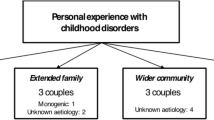Fragile X syndrome is primarily due to a CGG repeat expansion found in the FMR1 X-linked gene. In a previous study, we conducted focus groups with women to assess their attitudes towards fragile X carrier screening. In this follow-up study, we conducted in-depth interviews of general population reproductive-age women who were identified as carriers. We explored their attitudes toward testing for carrier status of the fragile X mutation. These women underwent screening primarily to participate in a research project rather than in search of a diagnosis for specific symptoms. As such, these women were wholly unprepared for positive carrier results. Their responses about their results and carrier screening, in many cases, were being worked out over the course of the interview itself. The most salient finding of this work is the apparent lack of relevance of carrier status to these women. Many expressed that although the information could be relevant in the future, it is not relevant at this stage of their lives in terms of family planning (either with respect to having unaffected offspring or to premature ovarian failure) and personal relationships. Although issues of abortion seemed prominent in the focus groups, we found that carrier status did not have an apparent effect on women’s attitudes about termination. We hypothesize this may be related to the fact that women had not processed their new carrier status and had not related it to previously-formed personal opinions. The findings of this work have significant implications for genetic counseling and population screening. Genetic counselors should be mindful that general population women may not recognize the immediate importance of their carrier status even when literature is provided and discussed prior to providing a sample. As part of comprehensive genetic counseling, counselors should identify the reproductive life stage of the woman receiving the new information and help her identify when this information would be more meaningful in her life. Counselors can assist in setting up a personalized road map with specific types of services that will be more applicable to the woman as her carrier status becomes more relevant.
Similar content being viewed by others
REFERENCES
Anido, A., Carlson, L. M., Taft, L., & Sherman, S. L. (2005). Women’s Attitudes Toward Testing for Fragile X Carrier Status: A Qualitative Analysis. J Genet Couns, 14, 295–306.
Bailey, D. B., Jr., (2004). Newborn screening for fragile X syndrome Ment Retard Dev Disabil Res Rev, 10, 3–10.
Chapman, E., & Smith, J. A. (2002). Interpretative phenomenological analysis and the new genetics. J Health Psychol, 7, 125–130.
Clayton, E. W., Hannig, V. L., Pfotenhauer, J. P., Parker, R. A., Campbell 3rd, P. W., & Phillips 3rd, J. A. (1996). Lack of interest by nonpregnant couples in population-based cystic fibrosis carrier screening. Am J Hum Genet, 58, 617–627.
Cronister, A., DiMaio, M., Mahoney, M. J., Donnenfeld, A. E., & Hallam, S. (2005). Fragile X syndrome carrier screening in the prenatal genetic counseling setting. Genet Med, 7, 246–250.
Fanos, J. H., Spangner, K. A., & Musci, T. J. (2006). Attitudes toward prenatal screening and testing for Fragile X. Genet Med, 8, 129–133.
Henneman, L., Bramsen, I., Van Os, T. A., Reuling, I. E., Heyerman, H. G., van der Laag, J., van der Ploeg, H. M., & ten Kate, L. P. (2001). Attitudes towards reproductive issues and carrier testing among adult patients and parents of children with cystic fibrosis (CF). Prenat Diagn, 21, 1–9.
Knowles, M. S. (1999). The Making of an Adult Educator: An Autobiographical Journey (pp. 83–84). San Francisco: Jossey-Bass.
McConkie-Rosell, A., Spiridigliozzi, G. A., Iafolla, T., Tarleton, J., & Lachiewicz, A. M. (1997). Carrier testing in the fragile X syndrome: Attitudes and opinions of obligate carriers. Am J Med Genet, 68, 62–69.
McConkie-Rosell, A., Spiridigliozzi, G. A., Rounds, K., Dawson, D. V., Sullivan, J. A., Burgess, D. et al. (1999). Parental attitudes regarding carrier testing in children at risk for fragile X syndrome. Am J Med Genet, 82, 206–211.
McConkie-Rosell, A., Spiridigliozzi, G. A., Sullivan, J. A., Dawson, D. V., & Lachiewicz, A. M. (2000). Carrier testing in the fragile X syndrome: Effect on self-concept Am J Med Genet, 92, 336–342.
Mennie, M. E., Compton, M. E., Gilfillan, A., Liston, W. A., Pullen, I., Whyte, D. A., & Brock, D. J. (1993) Prenatal screening for cystic fibrosis: psychological effects on carriers and their partners. J Med Genet, 30, 543–548.
Patton, M. Q. (2002). Qualitative Research and Evaluation Methods, Second Edition (p. 381). Thousand Oaks, California: Sage.
Wlodkowski, R. J. (1999). Enhancing Adult Motivation to Learn: A Comprehensive Guide for Teaching All Adults (p. 11). San Francisco: Jossey-Bass.
ACKNOWLEDGMENTS
We would like to thank the ESAL research team for their recruitment efforts and genetic testing. We would also like to thank Dr. Allyn McConkie-Rosell, Ms. Lisa Taft and Ms. Tiffany Woyboy for their helpful discussions. Lastly, we would like to thank all the women who participated in these in-depth interviews for their open discussions. This work was supported by NIH R01 HD29909 and NIH P01 HD35576.
Author information
Authors and Affiliations
Corresponding author
Rights and permissions
About this article
Cite this article
Anido, A., Carlson, L.M. & Sherman, S.L. Attitudes Toward Fragile X Mutation Carrier Testing from Women Identified in a General Population Survey. J Genet Counsel 16, 97–104 (2007). https://doi.org/10.1007/s10897-006-9049-0
Received:
Accepted:
Published:
Issue Date:
DOI: https://doi.org/10.1007/s10897-006-9049-0




